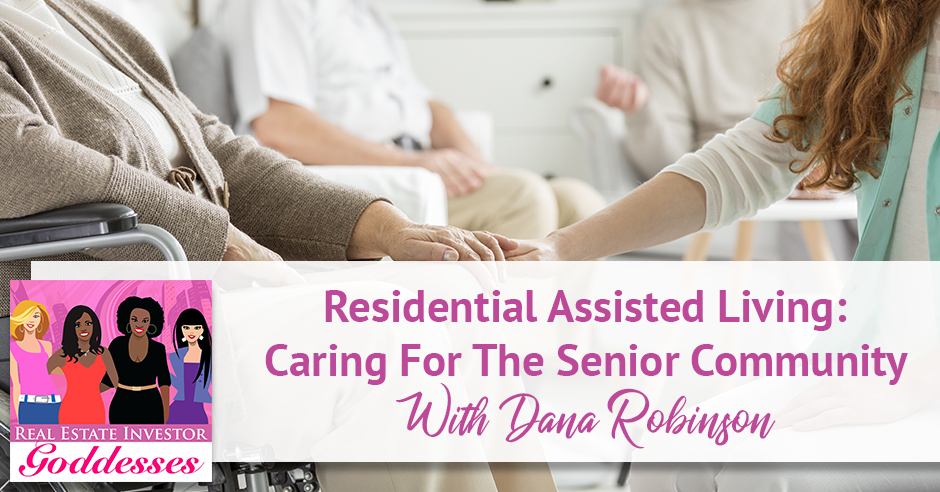
Staying in a hotel can feel luxurious and relaxing at times, but imagine living in one for the rest of your life. The seniors in our communities have contributed so much to society that it seems unfair to leave them in homes that are passive and can sometimes feel cold. Dana Robinson recognized this need and sought to help solve it. Dana was formerly a registered nurse before she invested in residential assisted living facilities. In this episode, she talks about the differences between a dementia and memory care facility and a typical residential assisted living facility. She shares the story of how she got started in real estate investing and the mistakes she ran into along the way. Dana is also the Co-Founder of Lighthouse Personal Care Homes. If somebody is interested in pursuing the same path she took, she gives her advice on being the owner and operator of assisted living facilities.
—
Watch the episode here:
Listen to the podcast here:
Residential Assisted Living: Caring For The Senior Community With Dana Robinson
I am honored and excited to have with us, Dana Robinson, who is certainly no exception to the badass rule. She is a registered nurse and she’s had over eighteen years of medical experience. Along with medical office management, she has a background in ICU critical care and neurology. In terms of her real estate investing, she is now in residential assisted living. She’s a Cofounder of Lighthouse Personal Care Homes. After earning her residential assisted living specialist certification to the Residential Assisted Living Academy, she’s focused her efforts on becoming a memory care or dementia specialist.
I’m super excited to have her talk more about this because this is such a huge trend in the real estate world and there’s so much opportunity. It’s going to be fascinating. She’s a student support success coach for Residential Assisted Living Academy. She’s a Virtual Dementia Tour Certified Trainer, a DACE coach, and a Positive Approach to Care Certified Trainer. As an owner and operator of memory care home, she emphasizes education and support for her staff, the resident families and for local communities. I’m super excited to have her with us. Welcome, Dana.
Thank you for having me. I appreciate being here and I’m looking forward to chatting with you for a little bit.
Tell us how did you get started in real estate investing.
As you mentioned, I do have a background in the medical field as a registered nurse. My husband and I, we weren’t married at the time but we started dabbling in some house flipping. In that process, we were going to our local REIA meetings and we ended up hearing Gene Guarino with the Residential Assisted Living Academy speak. I was immediately blown away. I was like, “This is such a perfect blend of my nursing background and the residential house flipping. We can blend that together.”
To say that you have to have a medical background to do assisted living is not true at all. Share on XTo say that you have to have a medical background to do the assisted living is not true at all. That’s why it made sense to me so quickly. My husband at the time was like, “I don’t know about this,” because he had more construction background. He was more into the house flipping and the acquisition and disposition of properties. With that, we decided to go to the Residential Assisted Living training. They do training throughout the year on how to do this. We did that and we jumped right in. It’s a funny story on how we got connected and decided to jump right into that but we went all into it.
It resonated with us. We liked the idea of being able to help many other people because we all have parents, we have grandparents. We have seniors in our community and the number of people needing assistance with where they live is growing. We focused on how we could do this. We had family members ourselves that needed assistance with where they were needing to live, whether it was with dementia or falling things like that. It resonated with us and we followed that program and then after going through all those steps, we then became support coaches and mentors for students to follow. What they say that the teacher is the greatest student. You start learning a lot more than you would on your own when you get to help other people. That’s how we got started with the assisted living and started educating ourselves and looking into more and more things that we could do in that field and into memory care and specializing in that.
I want to break down a few of the things that you said there because there was so much and so rich. One of the things I heard is you’re in residential assisted living and just to make sure we have no goddess left behind, how would you define a residential assisted living facility?
We’re all familiar with assisted living when I say we have seniors who are no longer able to live at home. Most of what we know of with assisted living is this large institution like a nursing home or even this big resort-style. There are long hallways and it’s not home. We spend our whole lives living in our own homes. When we need a little extra help, maybe going to the bathroom, maybe getting dressed, maybe meals being prepared for us, we’re expected to live in these big places.
I enjoy going on vacation and staying in a hotel from time to time but I don’t want to live there for the rest of my life. We all go on vacation and we have a great time and then you get home. Every time we go home and that first night back in your own bed, you go, “It’s nice to be home.” When we talk about residential assisted living, we’re saying that our seniors don’t have to be shipped off to these big facilities or these cold nursing home type of facilities. These are regular houses that are changed a little bit to accommodate some of the things that our seniors need.

They might have hallways that are a little wider or doorways that are a little wider to accommodate a wheelchair or a walker. We create a business inside of this residential home where we hire staff to help take care of people who need a little extra help and truly deserve to have a living room and sit at a regular table, and see somebody make a meal in a regular kitchen. It’s allowing aging to be more regular and allowing families. When my grandfather went into a big assisted living home, it took off that burden. He lived with my mom before he went into the care of home and she couldn’t care for him anymore.
At some point, most families try to bring their parent or their grandparent into their house and it changes that whole dynamic if you have kids, if you have work. We love our parents and we love our grandparents but we’re not meant to be their caregiver. It changes that relationship. By creating these residential assisted living homes, we are allowing the seniors who have laid the foundation of our society. We have privileges now because of what our seniors accomplished. It allows them to live in a house or in a home where they’re comfortable. It allows their children, their grandchildren and their spouses to remain spouses and not caregivers.
With the memory care and dementia care, oftentimes, they’ll be seniors that need more attention because of memory problems. What are the differences between dementia and memory care facilities and a more typical residential assisted living facility?
There are some black and white differences and then there’s a whole lot of gray differences. Depending on your state or your local regulations, some states have outlined differences in what you need to do. It might be something like securing the home. You might have to have locked doors to where people who have memory conditions, whether it’s dementia or get lost and confused, they can’t walk out the front door and get lost in the neighborhood. That might be one of your local requirements. Other places are a little grayer. There are not as many differences there. It is based on your local regulations but in a broad sense. It would be different types of interactions. People living with dementia respond differently. They react a little bit differently because of the changes that are going on in their brain. I can tell you that the Alzheimer’s Association says that every 65 seconds, somebody in the United States is developing Alzheimer’s and that’s only one type of dementia, one type of memory condition. There’s a huge need in our community for assisted living but also for dementia. The truth is most of us don’t look for assistance for our loved ones until we start noticing some of these memory and dementia behaviors.
You were saying that you don’t need to have a medical background in order to do these houses. It is a business, you’re owning the property and you’re operating the business. That can be split up. If somebody is interested in pursuing this, what advice would you give around being the owner and operator of this type of facility?
It's easy to get fixated on one project because you fall in love with it and you get excited about it. Share on XThat’s absolutely right. These are two different businesses. You own the property or you could find an investor to own the property. There’s the business part of it. Those are two distinct businesses. You can choose to do both or you can choose to do one or the other. As far as my advice for somebody interested in this field, I would say surround yourself with people who are doing this. I went through the Residential Assisted Living Academy, not only because I’m part of the support team now, but when I was going through it, the support is phenomenal. It is professionally run. You are running a professional business and you’re doing something good for the community. You’re doing something good for our senior population but it is a business. It can be a profitable business if it’s run well and part of that is the service that you provide. You definitely need to know how to do it and what to do. I would encourage anybody to look into training for it. If you want to do something, if you want to be somebody doing that thing, then you need to educate yourself and surround yourself with those people. Find a mentor, find an organization that is teaching it or doing it successfully.
I always say education is such an important part of real estate investing, you’re going to get an education, either way, you can do it on the front end where it’s cheaper and not as painful or you can get an education by trying. Even with an education, I know that mistakes happen. I want to ask you a question that I asked all of my guests, which is what was your biggest mistake in your real estate investing career and what did you learn from it?
A big mistake is focusing on one thing at a time. No matter what you’re doing in real estate investing, whether it’s assisted living, whether it’s buy and hold, buy and sell or whatever it is, we all know that not every deal happens, not everything goes through. Focusing only on one thing at a time makes that process so much longer because if it doesn’t work out, we wasted how many months of trying on this one project. Make sure you have lots of irons in the fire. If you are looking for one property, one project, maybe you need to have a few houses under contract or at least Letters of Intent while you do your due diligence. Do your due diligence and make sure you do your homework in that process.
Tell us the story. What happened to you that now you’ve learned from this mistake? What is your story?
Focusing on one project at a time. Things always tend to take longer. We were under contract on a project and at the end of the day, we were outbid at the last minute. It wasted lots and lots of time. We wasted some money because if you’re going to be doing some renovations, you might have to hire an architect or an engineer for drawings. As much as I’d like to say that we learned from one time of focusing on one property, it was maybe number two that we learned that lesson. It’s easy to get fixated on one project because you fall in love with it. You get excited about it.

Residential Assisted Living: We love our parents and we love our grandparents, but we’re not meant to be their caregiver. It changes that relationship.
We had a project in Florida that we were focusing on. We were in that project for about 4 or 5 months and at the very last minute, a local hospital came in and outbid us for the property. The lesson learned for them is they did not do their due diligence. That property is sitting there because of what they wanted to do for it, there’s not a big enough parking lot. We’re maybe circling back and seeing if we can get it for less than what they got for it because they’re paying property taxes. That one, we ended up losing out and wasting five months of time because we weren’t looking ahead and working on more than one project at a time. That would be the big advice I have is keep pressing forward and don’t put one iron in the pot and expect it to be the only.
Not everything works out.
If you fail, keep going.
Not so many things that you can’t focus but enough that if this one doesn’t work out, it might be that one or that one. You have a variety of possibilities going at once. What are you most proud of in your real estate investing?
I never expected to be investing in senior housing. I am humbled when I realize how many lives I am impacting. When we have a new resident move in and I find out that they were considered having behavior issues and educating my staff, the families, and the communities that it’s all about how we interact with those residents. It can make such a difference, not just to that one person but to their family and to the community. Realizing that what I am doing is much bigger than me and much bigger than you and truly be a servant to a greater need.
You have to be able to balance and know when something isn't going to work, but not give up on the bigger picture. Share on XWhat do you attribute to your success?
Perseverance, 100%. You definitely have to be able to balance and know when something isn’t going to work, but not giving up on the bigger picture. When you hit a roadblock, making sure that you turn it into an obstacle. I like to say that failure is only failure if you quit. Knowing how to overcome obstacles and knowing that things might not turn out the way we want them to at the moment, but everything always turns out the way it’s supposed to. Being able to press forward and look at things from a positive light is why we’re successful in what we’re doing and helping others see that as well.
What advice do you have for a woman who’s just starting out in this field?
My advice goes back to persevering through, don’t quit, don’t give up, and surround yourself with education. There are podcasts out there. There are Facebook groups, there are people doing what you want to do. When you visualize yourself being what you want to be, you have to surround yourself with people doing those things.
What do you wish you’d known at the beginning that you now know?

Residential Assisted Living: Interacting with the residents can make such a difference not just to that one person but to their family and to the community.
I would definitely get some legal advice when you are in the assisted living business. If you’re doing residential properties, depending on the area, sometimes you have to get a property rezoned or you might have to request a conditional use or variants of some sort. In the beginning, we were naive and thinking that this was such a wonderful thing for seniors and for the community. We underestimated some good old boy system that is in play politically. I would say that not everybody has to educate their community when they want to bring this to where you are. Some communities are encouraging this. They recognize that there’s a need and others aren’t quite up to date on this growing industry. If you have to do any zoning or any changes like that, make sure you have the right team. When I say legal counsel, that doesn’t mean just any attorney to help you in that. I would say find someone that’s done this before. Find somebody that knows the laws and knows your rights. Just because somebody is an attorney doesn’t mean they know how to get this done for your best interest.
That’s good advice with any team member. A lot of people think, “I need a lawyer, a CPA, a broker or a property manager,” like all of those things are created equally. It’s like having a doctor, “That guy is a doctor, he can do my heart surgery.” “No, that’s a podiatrist.” You want the heart surgeon working on your heart surgery, just like you want the lawyer that knows how to get that this is a living facility. It’s important that you get the right person for the job that has that specialization. Just because they’re a lawyer and they could legally represent you doesn’t mean that they’re the best fit for that job. It sounds good advice. Before we get into the trinity, what is one way that people could get in touch with you if they want to find out more?
Our website is LighthousePCH.com. There’s a contact page. They’re welcome to email me directly at [email protected].
It’s time for our trinity. The trinity is a brag, something you’re celebrating, something you’re grateful for, and something you desire. What is your brag?
I dove into becoming a memory care and dementia specialist and I have received my certification to be a positive approach to care certified trainer as well as a virtual dementia tour certified trainer. I’m excited to bring those tools to the community, to our homes and to lots of other residential assisted living owners/operators that are interested in these special unique tools and experiences. I’m proud to have accomplished those certifications. It’s exciting.
What’s one thing you are grateful for?
When you visualize yourself being what you want to be, you have to surround yourself with people doing those things. Share on XI am grateful for the time as entrepreneurs, especially female entrepreneurs. I’m your classic mompreneur. I get to work from anywhere in the world as you are now in a different country. That’s exciting that we get to be moms or travel or be anywhere and still be successful in our endeavors.
Last but certainly not least, what’s one thing you desire?
I was talking with my husband about how different people measure wealth and some people measure it in their free time. Others measured it in how many properties they have or how big their houses or what car they drive. We were talking about measuring our wealth in the ability to truly give and help others. Being able to help somebody at a level greater than ourselves. Specifically, I have come across and become a part of the Second Wind Dreams program which is in a nutshell like Make A Wish but for seniors. One of the projects that we’re working on is fulfilling the dreams of our residents. One specific, we have a resident who is a World War II veteran and loves this country and wants nothing more than to meet the President. I am working on trying to arrange that and get him a handshake with the President. If anybody knows how to get me in touch with the President, please reach out to me because he is a wonderful man and I would love to make that wish come true for him.
You desire to help your resident whose desire is to meet the President.
My husband and I were talking about measuring wealth by how much we can help others and how much we can give. I would love to be able to meet that dream for him and that would be the highlight of life.
So shall your desire be or so much better than you can imagine. If anyone reading out there has a connection to the President of the United States and can help make this happen for a deserving veteran, then let us know. That’s beautiful. Thank you so much, Dana. This was such a pleasure.
Thank you very much for having me. I enjoyed it.
If you want to connect with her, you can connect with her at LighthousePCH.com and you can connect with me at REIGoddesses.com. You’ll find the information there. We talked a lot about education so join us at our next Wealth Through Real Estate event. You could be surrounded by incredible women that are investing in real estate and learn how to get into this game. Learn about our passive investing opportunities and other goodies. Subscribe and join us next time for another amazing Real Estate Investor Goddesses interview.
Important Links:
- Lighthouse Personal Care Homes
- Residential Assisted Living Academy
- LighthousePCH.com
- [email protected]
- Second Wind Dreams
- Wealth Through Real Estate
About Dana Robinson
 Dana is the co-founder of Lighthouse Personal Care Homes. After earning her Residential Assisted Living Specialist Certification through Residential Assisted Living Academy she has focused her efforts on becoming a memory care and dementia specialist. She is a student support success coach for RAL Academy, a Virtual Dementia Tour Certified Trainer, a DACE coach, and a Positive Approach to Care Certified Trainer.
Dana is the co-founder of Lighthouse Personal Care Homes. After earning her Residential Assisted Living Specialist Certification through Residential Assisted Living Academy she has focused her efforts on becoming a memory care and dementia specialist. She is a student support success coach for RAL Academy, a Virtual Dementia Tour Certified Trainer, a DACE coach, and a Positive Approach to Care Certified Trainer.
She is also a registered nurse with 18+ years of medical experience. Along with medical office management, she has a background in ICU, Critical Care, & Neurology.
As an owner-operator of a memory care home, she emphasizes education and support for staff, resident families, and local communities.





